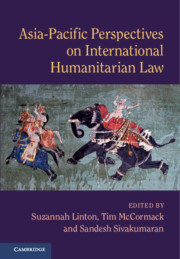Book contents
- Asia-Pacific Perspectives on International Humanitarian Law
- Asia-Pacific Perspectives on International Humanitarian Law
- Copyright page
- Contents
- Figures and Tables
- Contributors
- Foreword
- Foreword
- Acknowledgements
- Editors’ Note
- 1 Introduction: Asia-Pacific Perspectives on International Humanitarian Law
- Part I Interviews
- Part II Development of International Humanitarian Law
- Part III Practice and Application of International Humanitarian Law
- Part IV Implementation and Enforcement of International Humanitarian Law
- 28 International Humanitarian Law in the Indian Civilian and Military Justice Systems
- 29 Implementation of International Humanitarian Law Obligations in Australia: A Mixed Record
- 30 International Humanitarian Law in Indonesia
- 31 International Humanitarian Law in the Philippine Supreme Court
- 32 The Application of Grave Breaches at the Extraordinary Chambers in the Courts of Cambodia
- 33 The Application of International Humanitarian Law by the International Crimes Tribunals of Bangladesh
- 34 The Application of the Geneva Conventions in Nepal: Domestication As a Way Forward
- 35 Torture in Non-International Armed Conflict and the Challenge of Universal Jurisdiction: The Unsuccessful Trial of Colonel Kumar Lama
- Part V Looking to the Future and Enhancing Compliance with International Humanitarian Law
- Glossary of Publications
- Alphabetical Glossary of Cases and Decisions
- Chronological Glossary of Cases and Decisions
- Treaties and Other International Instruments, Resolutions and National Documents with an International Dimension
- Chronological Glossary of National Legislation and Secondary Instruments
- Peace Agreements and Communiques
- Abbreviations and Translations
- Index
28 - International Humanitarian Law in the Indian Civilian and Military Justice Systems
from Part IV - Implementation and Enforcement of International Humanitarian Law
Published online by Cambridge University Press: 18 October 2019
- Asia-Pacific Perspectives on International Humanitarian Law
- Asia-Pacific Perspectives on International Humanitarian Law
- Copyright page
- Contents
- Figures and Tables
- Contributors
- Foreword
- Foreword
- Acknowledgements
- Editors’ Note
- 1 Introduction: Asia-Pacific Perspectives on International Humanitarian Law
- Part I Interviews
- Part II Development of International Humanitarian Law
- Part III Practice and Application of International Humanitarian Law
- Part IV Implementation and Enforcement of International Humanitarian Law
- 28 International Humanitarian Law in the Indian Civilian and Military Justice Systems
- 29 Implementation of International Humanitarian Law Obligations in Australia: A Mixed Record
- 30 International Humanitarian Law in Indonesia
- 31 International Humanitarian Law in the Philippine Supreme Court
- 32 The Application of Grave Breaches at the Extraordinary Chambers in the Courts of Cambodia
- 33 The Application of International Humanitarian Law by the International Crimes Tribunals of Bangladesh
- 34 The Application of the Geneva Conventions in Nepal: Domestication As a Way Forward
- 35 Torture in Non-International Armed Conflict and the Challenge of Universal Jurisdiction: The Unsuccessful Trial of Colonel Kumar Lama
- Part V Looking to the Future and Enhancing Compliance with International Humanitarian Law
- Glossary of Publications
- Alphabetical Glossary of Cases and Decisions
- Chronological Glossary of Cases and Decisions
- Treaties and Other International Instruments, Resolutions and National Documents with an International Dimension
- Chronological Glossary of National Legislation and Secondary Instruments
- Peace Agreements and Communiques
- Abbreviations and Translations
- Index
Summary
While modern international humanitarian law (IHL) is linked most directly to nineteenth- and twentieth-century Europe, India over the period of its 5,000 years history has developed its own rules of warfare for the protection of non-combatants and civilian populations akin to modern IHL. Many scholarly works provide an extensive overview of the norms of conflict in ancient India. In the ancient period, implementation of these Dharma-based Hindu and Buddhist principles were followed by the rulers and decision makers as their paramount duty. However, the status of IHL implementation in modern Indian history is not as great as its ancient past despite the comparatively high number of conflicts it has had with its neighbours, along with numerous internal conflict situations which it has been grappling with. Contemporary India is often criticised for its indifference to the effective implementation of its international law commitments, especially IHL obligations. Though a party to the universally ratified four Geneva Conventions of 1949 (Geneva Conventions), India is still not keen on acceding to the Additional Protocols to the Geneva Conventions.
- Type
- Chapter
- Information
- Asia-Pacific Perspectives on International Humanitarian Law , pp. 475 - 490Publisher: Cambridge University PressPrint publication year: 2019



